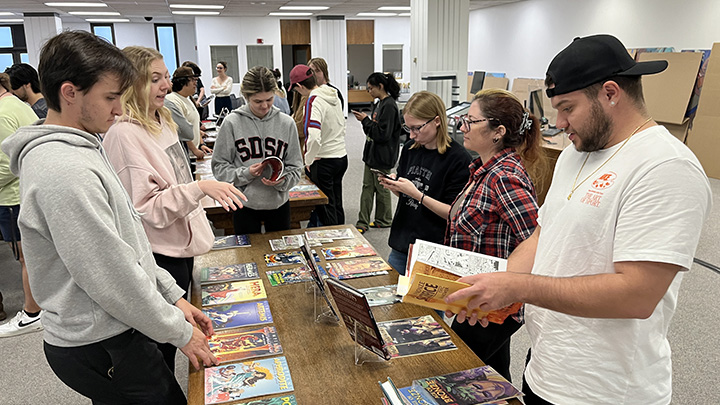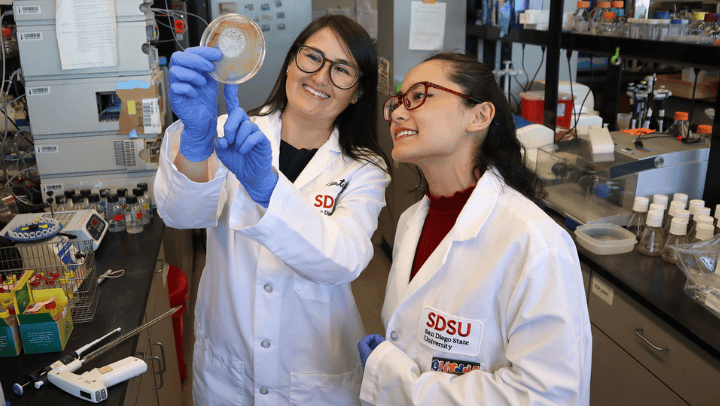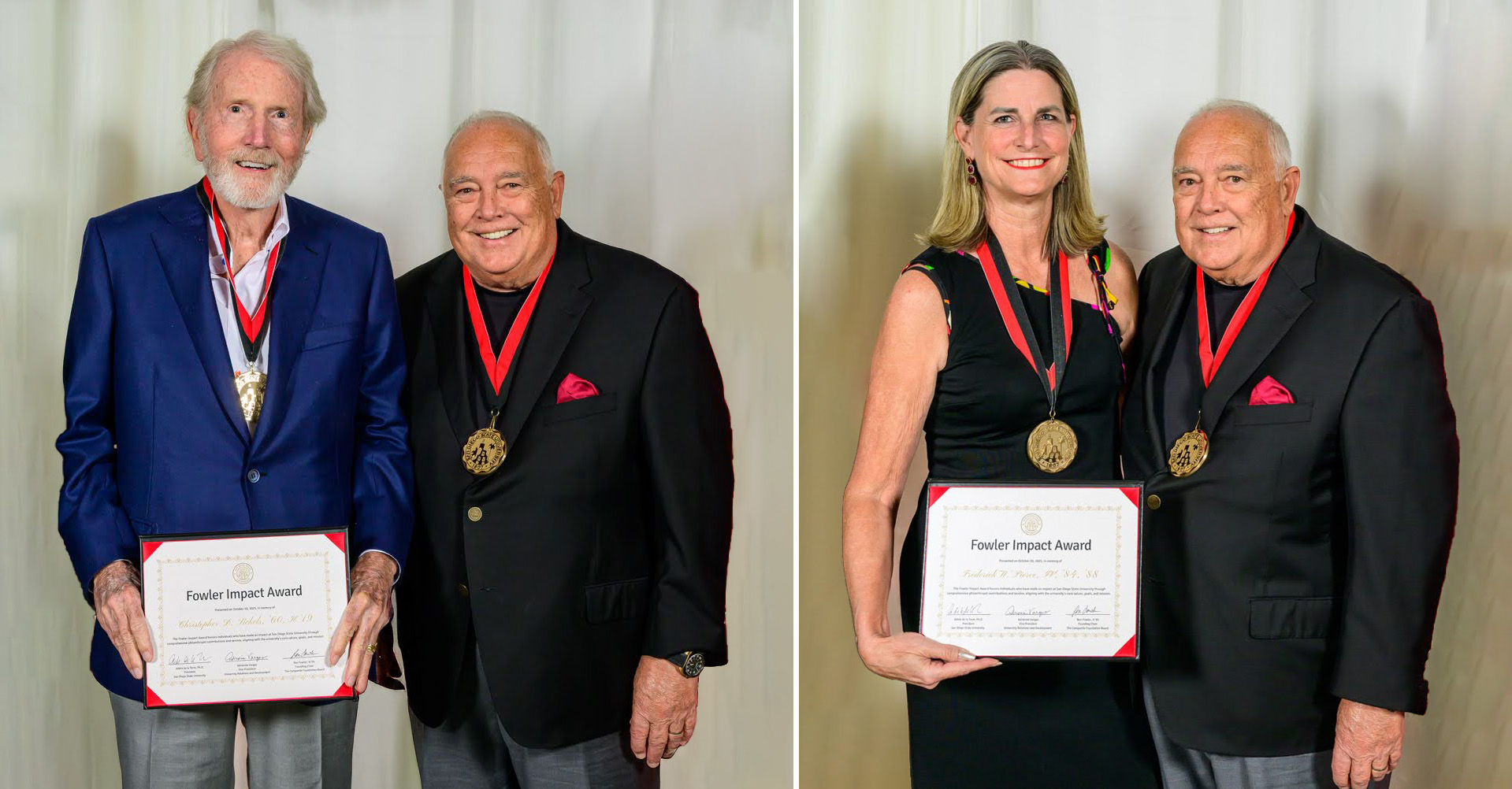The Library and the Research University
As the research enterprise has grown at SDSU, librarians have collaborated with campus partners to increase access to research data services.

As a critical component of the infrastructure for learning, scholarship, and engagement at San Diego State University, the University Library promotes, enhances, and extends the research, creative activities, and advanced education that have led to the University’s recognition through the Carnegie Classification process as an R1 institution.
Library Dean Scott Walter said, “Our faculty have come together in collaboration with colleagues across Academic Affairs, the Division of Information Technology, and the Division of Research and Innovation to strengthen traditional research support services and deliver an array of new services that support research-informed teaching, interdisciplinary scholarship, and the discovery of new knowledge.”
Library faculty have collaborated with colleagues across Academic Affairs, the Division of Information Technology, and the Division of Research and Innovation to strengthen traditional research support services and deliver an array of new services that support research-informed teaching, interdisciplinary scholarship, and the discovery of new knowledge.
Librarians, for example, provide in-depth research consultations to SDSU students, scientists, and faculty. While these may begin with a routine engagement with undergraduate students designed to help them locate resources for a class project, they often develop into more substantive engagements in which librarians assist students and faculty in locating specialized information needed for research projects, completing systematic reviews of the literature, or designing research data management plans.
“As a biomedical librarian, I have disciplinary expertise that helps me teach students about scholarly literature and other resources in a field and apply them to their topic,” said Margaret Henderson, Health Sciences and Research Data Services Librarian. “This same expertise can help faculty ensure they have considered alternative vocabularies and resources, which is important given the information overload we all face. And I can also help organize literature and data to be easily found and analyzed.”
Recognizing undergraduate research as essential to the larger research enterprise at SDSU, librarians provide support to a number of SDSU programs, including the SDSU Student Symposium (S3), Black Research Symposium, Native and Indigenous Research and Arts Symposium, and Pride Research Symposium. Many of these undergraduate student works are made available through the library’s institutional repository.
The repository is also home to SDSU’s collection of electronic theses and dissertations, providing access to the culminating work of SDSU undergraduate and graduate students since 1939. While most of the materials available electronically represent student scholarship since 2010, older materials are available in print through the library and University Archives.
Librarians and archivists are not only key to the curation and provision of access to SDSU student scholarship but also play an important role in assisting advanced undergraduate and graduate students to conduct in-depth reviews of the literature, identify and gain access to data sets and published materials held locally or in other libraries, and consider options for the management of their intellectual property within the context of a volatile environment for scholarly and scientific communication and publication.
For example, library collections, especially those made available as part of Special Collections and University Archives, provide critical support for identifying and pursuing independent research projects.
Anna Culbertson, head of Special Collections and University Archives (SCUA), said undergraduate and graduate students visit SCUA. “For hands-on engagement with primary sources, opportunities to work with rare books and documents, and in some cases, even develop new and unique scholarship around silences or gaps in the historical record.”
More advanced support for disseminating and publishing new scholarship, including advice on managing copyright agreements and using “open access” models for disseminating the results of SDSU-sponsored research, is also available through the library.
As the research enterprise has grown at SDSU, and as a greater number of funders have required students, scholars, and scientists to make the results of their work more broadly available through institutional, scholarly, or data repositories, librarians have collaborated with campus partners to increase access to research data services, including support for accessing data sets, cleaning and organizing data, resources for data security and storage, and creating metadata and documentation that will allow data-intensive research conducted at SDSU to be more easily discovered and cited by scholars around the globe.
Mark Reed, senior associate vice president for research, said the University Library “has been a fantastic supporter of the Division of Research and Innovation in meeting the research data needs of our students, faculty, and staff. The past several years have seen incredible growth in the services provided by both the library and SDSU Information Technology. We're grateful for these strong partnerships that serve our larger Research, Scholarship and Creative Activities community on campus."
Library faculty collaborate with colleagues to support interdisciplinary inquiry and research projects across the university. The Center for Comics Studies, an interdisciplinary center that has received grants from the Institute for Museum and Library Services and the National Endowment for the Humanities (NEH), was co-founded by faculty in the University Library and the College of Arts and Letters and library faculty and staff have been leaders in the establishment of partnerships with cultural heritage organizations in Mexico leading to the development of the Collecciones de Instituciones Mexicanas, which has also drawn support from the NEH. More information on library-based research activities is available online.
Research and research-informed teaching and learning have been growing at SDSU, and the University Library has continuously reviewed its collections, spaces, and services to ensure that it remains a core component in SDSU’s research infrastructure and its growing commitment to scholarship, creative activity, and advanced education across the curriculum. With SDSU’s recognition as an R1 institution, and commitment to continuing to sustain and support a growing research enterprise, the library will continue to evolve and innovate in ways that support research activities in partnership with faculty in our classrooms, labs, and community sites.



